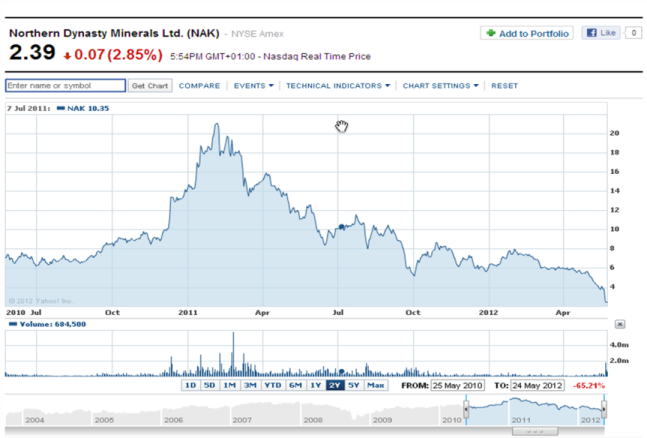The proposal to build one of the world's largest gold and copper mines at the head of the Bristol Bay watershed -- the massive Pebble Mine -- has generated a lot of press for the risks it would pose to the health of Alaska's incomparable wild salmon fishery and the region's communities, people, and wildlife that depend on it. Earlier this month, the U.S. Environmental Protection Agency ("EPA") released its 15 month draft Watershed Assessment, documenting in scientific detail the devastating impacts of large-scale mining on that pristine and uniquely productive ecosystem.
The project is also a bad financial investment. If a picture is worth a thousand words, then this two-year chart of the share price of the 50 percent owner of the Pebble project -- the Canadian-based mining company Northern Dynasty Minerals Ltd. -- says it all:

From its February 2011 high of over $21 a share to last Friday's low of $2.33 a share, the company's stock seems in a race to the bottom.
And what caused this nose-dive since February 2011? Many things, certainly, but here are a few important developments that may have affected investor confidence:
First, in February 2011, EPA announced that it would undertake a scientific assessment of the impacts of large-scale mining in the Bristol Bay watershed -- an assessment released in draft this month. In a heartbeat, Northern Dynasty's CEO Ron Thiessen greeted the draft scientific assessment with "every expectation that the deep flaws in the draft Bristol Bay Watershed Assessment report will be exposed," calling the agency's action "pure hubris." EPA's independent science -- that is, science not conducted or controlled by the Pebble Partnership -- is decidedly not good news for the company.
Second, also in February 2011, Mitsubishi Corporation -- at that point a significant shareholder in Northern Dynasty -- sold all of its shares in the company. Mitsubishi had decided to focus its copper mining somewhere other than Pebble.
Third, public opinion poll after poll have continued to confirm the strong and intensifying opposition, in the Bristol Bay region and elsewhere, to the Pebble Mine proposal. In October 2011, in the Lake and Peninsula Borough where the Pebble Mine would be located, the residents approved a "Save Our Salmon" initiative prohibiting any large-scale resource extraction harmful to salmon -- a prohibition that precludes the Pebble project. Although the Pebble Partnership is challenging it in court, there is nothing it can do to erase the voters' judgment.
According to a poll released in August 2011, 85 percent of Bristol Bay commercial fishermen oppose the Pebble Mine. In a poll released in November 2011, 81 percent of the shareholders of the Bristol Bay Native Corporation, a major developer and the largest private landowner in the region, opposed the Pebble Mine. And in December, NRDC released the first poll in the lower 48: once informed of the project's pros and cons, the voters surveyed opposed the project by a staggering 77 percent.
Fourth, in April 2012, the CEO of another significant shareholder in Northern Dynasty -- Rio Tinto -- publicly announced at Rio's annual shareholder meeting in London that, with respect to Pebble, "an open pit mine is not the way to go," and "I have no interest in looking at it from an overground perspective." Since Northern Dynasty has committed itself irrevocably to a massive open pit design at Pebble, Rio Tinto's public disassociation from the concept is a major blow to the entire venture.
Also in Apil 2012, NRDC reached the one million mark in petitions of protest against the Pebble Mine -- an astonishing level of opposition to a project whose federal permit application has not even been filed.
Finally, far from dissipating, the opposition from all quarters -- local communities, Native villages and village corporations, Bristol Bay businesses, commercial and recreational fishermen, subsistence fishermen, hunters, conservationists, investors, jewelers, fish processors, the retail food industry, and on and on -- is increasing, in intensity and breadth. As much as any other single factor, it is this unstoppable tide of opposition -- rising as public awareness grows -- that may ultimately prove to be Pebble's (and Northern Dynasty's) Achilles heel.
The Pebble Mine makes no sense environmentally, economically, culturally, or legally, and it ought to be abandoned.
Take action now to stop the Pebble Mine.
